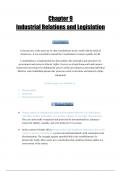Chapter 9
Industrial Relations and Legislation
Constitution
SA boasts one of the most up-to-date constitutions in the world with the birth of
democracy. It was essential to amend the Constitution to ensure equality for all.
A constitution is a fundamental law that outlines the principles and structure of a
government and protects citizens' rights. It serves as a legal framework and ensures
democratic governance by defining the powers of the government, protecting individual
liberties, and establishing democratic processes such as elections and minority rights
safeguards.
In this chapter, we will look at…
1. Human rights
2. Inclusivity
3. Environmental issues
1. Human Rights
● Human rights are fundamental rights and freedoms inherent to all individuals,
regardless of their nationality, race, gender, religion, or any other characteristic.
They are universally recognized and protected by international law, aiming to
ensure the dignity, equality, and well-being of every person.
● In the context of South Africa, human rights hold significant importance due to the
country's history of apartheid, a system of institutionalized racial segregation and
discrimination. The struggle against apartheid led to the establishment of a
democratic South Africa and a new constitution that enshrines human rights as a
cornerstone of the nation.
, ● The Constitution of South Africa, adopted in 1996, includes a comprehensive Bill of
Rights 1that guarantees a wide range of human rights. These rights encompass civil,
political, economic, social, and cultural aspects, and they apply to all individuals
within South Africa's jurisdiction.
e Bill of Rights in South Africa's constitution recognises and protects various rights, including
but not limited to: (don't need to know this; Enrichment)
1. Equality: Prohibiting discrimination on grounds such as race, gender, religion, and
sexual orientation.
2. Freedom of expression: Safeguarding the right to express opinions and receive
information freely.
3. Right to life and dignity: Protecting the sanctity of life and the inherent worth and
dignity of individuals.
4. Freedom of association: Ensuring the right to form and join associations, including
political parties and trade unions.
5. Socio-economic rights: Including rights to housing, healthcare, education, and social
security.
● South Africa's constitution also establishes institutions like the Human Rights
Commission and the Constitutional Court to protect and promote human rights
within the country.
● The recognition of human rights in South Africa's constitution represents a
significant step towards redressing past injustices and building a society based on
equality, dignity, and social justice. It provides a legal framework for individuals to
claim and assert their rights and ensures that the government respects and upholds
these fundamental principles.
1
A bill of rights is a document or part of a constitution that outlines and protects the fundamental
rights and freedoms of individuals within a country.
, Limitation Clause
● refers to a provision within a constitution or a bill of rights that allows for certain
restrictions or limitations on the exercise of rights and freedoms.
● While a bill of rights typically guarantees fundamental rights, there may be
circumstances where it is necessary to place reasonable limitations on those rights
in order to balance them with other important societal interests or to protect the
rights of others.
● A Limitation Clause usually sets out the conditions and criteria under which rights
can be limited, such as for the purpose of national security, public order, public
health, or the protection of the rights and freedoms of others.
● These limitations must be justified, proportionate, and necessary in a democratic
society.
● The inclusion of a Limitation Clause recognizes the complex nature of human rights
and acknowledges that there may be situations where the absolute exercise of a
right could have negative consequences.
● It provides a framework for balancing competing interests while ensuring that the
core principles of human rights are upheld.




